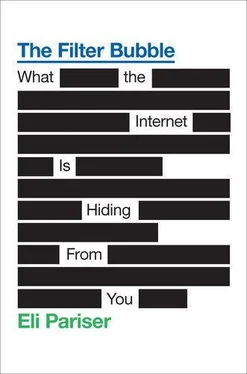In the filter bubble, things look different. You don’t see the things that don’t interest you at all. You’re not even latently aware that there are major events and ideas you’re missing. Nor can you take the links you do see and assess how representative they are without an understanding of what the broader environment from which they were selected looks like. As any statistician will tell you, you can’t tell how biased the sample is from looking at the sample alone: You need something to compare it to.
As a last resort, you might look at your selection and ask yourself if it looks like a representative sample. Are there conflicting views? Are there different takes, and different kinds of people reflecting? Even this is a blind alley, however, because with an information set the size of the Internet, you get a kind of fractal diversity: at any level, even within a very narrow information spectrum (atheist goth bowlers, say) there are lots of voices and lots of different takes.
We’re never able to experience the whole world at once. But the best information tools give us a sense of where we stand in it—literally, in the case of a library, and figuratively in the case of a newspaper front page. This was one of the CIA’s primary errors with Yuri Nosenko. The agency had collected a specialized subset of information about Nosenko without realizing how specialized it was, and thus despite the many brilliant analysts working for years on the case, it missed what would have been obvious from a whole picture of the man.
Because personalized filters usually have no Zoom Out function, it’s easy to lose your bearings, to believe the world is a narrow island when in fact it’s an immense, varied continent.
I believe this is the quest for what a personal computer really is. It is to capture one’s entire life.
—Gordon Bell
You have one identity,” Facebook founder Mark Zuckerberg told journalist David Kirkpatrick for his book The Facebook Effect . “The days of you having a different image for your work friends or coworkers and for the other people you know are probably coming to an end pretty quickly…. Having two identities for yourself is an example of a lack of integrity.”
A year later, soon after the book had been published, twenty-six-year-old Zuckerberg sat onstage with Kirkpatrick and NPR interviewer Guy Raz at the Computer History Museum in Mountain View, California. “In David’s book,” Raz said, “you say that people should have one identity…. But I behave a different way around my family than I do around my colleagues.”
Zuckerberg shrugged. “No, I think that was just a sentence I said.”
Raz continued: “Are you the same person right now as when you’re with your friends?”
“Uh, yeah,” Zuckerberg said. “Same awkward self.”
If Mark Zuckerberg were a standard mid-twenty-something, this tangle of views might be par for the course: Most of us don’t spend too much time musing philosophically about the nature of identity. But Zuckerberg controls the world’s most powerful and widely used technology for managing and expressing who we are. And his views on the matter are central to his vision for the company and for the Internet.
Speaking at an event during New York’s Ad Week, Facebook COO Sheryl Sandberg said she expected the Internet to change quickly. “People don’t want something targeted to the whole world—they want something that reflects what they want to see and know,” she said, suggesting that in three to five years that would be the norm. Facebook’s goal is to be at the center of that process—the singular platform through which every other service and Web site incorporates your personal and social data. You have one identity, it’s your Facebook identity, and it colors your experience everywhere you go.
It’s hard to imagine a more dramatic departure from the early days of the Internet, in which not exposing your identity was part of the appeal. In chat rooms and online forums, your gender, race, age, and location were whatever you said they were, and the denizens of these spaces exulted about the way the medium allowed you to shed your skin. Electronic Frontier Foundation (EFF) founder John Perry Barlow dreamed of “creating a world that all may enter without privilege or prejudice accorded by race, economic power, military force, or station of birth.” The freedom that this offered anyone who was interested to transgress and explore, to try on different personas for size, felt revolutionary.
As law and commerce have caught up with technology, however, the space for anonymity online is shrinking. You can’t hold an anonymous person responsible for his or her actions: Anonymous customers commit fraud, anonymous commenters start flame wars, and anonymous hackers cause trouble. To establish the trust that community and capitalism are built on, you need to know whom you’re dealing with.
As a result, there are dozens of companies working on deanonymizing the Web. PeekYou, a firm founded by the creator of RateMyProfessors.com, is patenting ways of connecting online activities done under a pseudonym with the real name of the person involved. Another company, Phorm, helps Internet service providers use a method called “deep packet inspection” to analyze the traffic that flows through their servers; Phorm aims to build nearly comprehensive profiles of each customer to use for advertising and personalized services. And if ISPs are leery, BlueCava is compiling a database of every computer, smartphone, and online-enabled gadget in the world, which can be tied to the individual people who use them. Even if you’re using the highest privacy settings in your Web browser, in other words, your hardware may soon give you away.
These technological developments pave the way for a more persistent kind of personalization than anything we’ve experienced to date. It also means that we’ll increasingly be forced to trust the companies at the center of this process to properly express and synthesize who we really are. When you meet someone in a bar or a park, you look at how they behave and act and form an impression accordingly. Facebook and the other identity services aim to mediate that process online; if they don’t do it right, things can get fuzzy and distorted. To personalize well, you have to have the right idea of what represents a person.
There’s another tension in the interplay of identity and personalization. Most personalized filters are based on a three-step model. First, you figure out who people are and what they like. Then, you provide them with content and services that best fit them. Finally, you tune to get the fit just right. Your identity shapes your media. There’s just one flaw in this logic: Media also shape identity. And as a result, these services may end up creating a good fit between you and your media by changing… you. If a self-fulfilling prophecy is a false definition of the world that through one’s actions becomes true, we’re now on the verge of self-fulfilling identities, in which the Internet’s distorted picture of us becomes who we really are.
Personalized filtering can even affect your ability to choose your own destiny. In “Of Sirens and Amish Children,” a muchcited tract, information law theorist Yochai Benkler describes how more-diverse information sources make us freer. Autonomy, Benkler points out, is a tricky concept: To be free, you have to be able not only to do what you want, but to know what’s possible to do. The Amish children in the title are plaintiffs in a famous court case, Wisconsin v. Yoder, whose parents sought to prevent them from attending public school so that they wouldn’t be exposed to modern life. Benkler argues that this is a real threat to the children’s freedom: Not knowing that it’s possible to be an astronaut is just as much a prohibition against becoming one as knowing and being barred from doing so.
Читать дальше











